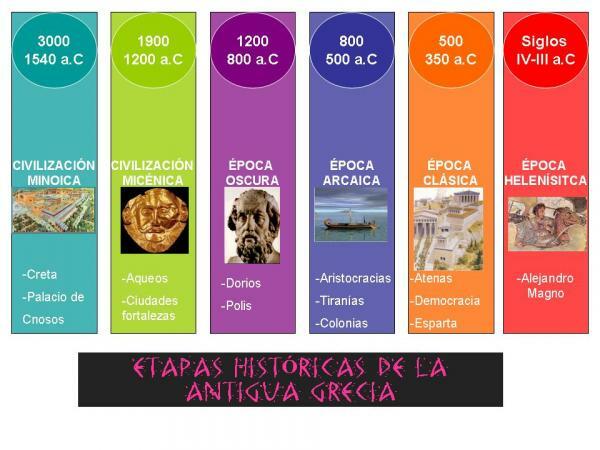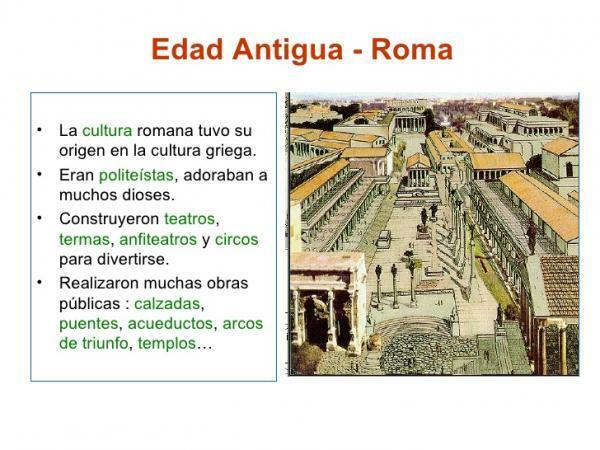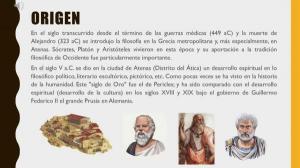Ancient civilizations of Europe

Our present would be very different if it weren't for the fact that many centuries ago a series of cultures existed, from which we largely come and for that reason we have many of their characteristics. In the case of Europeans, we all come from a few civilizations that inhabited Europe during the Ancient AgesThe most famous being the Romans and the Greeks, but not the only ones. To know our past, in this lesson from a TEACHER we are going to offer a summary of the ancient civilizations of Europe.
To start talking about the main European civilizations we must talk about the greek empire, being the oldest European influence group. Ancient Greece is the way we call the period of Greek history that goes from the Ages Dark and the arrival of the Dorians, until the Roman conquest of the Greek lands, being a period understood between 1200 a. C. until 146 a. C.
The great importance of the Greeks lies in the fact that it is considered to be the mother culture of Westerners, a great part of our being is born in it, and that is why even their conquerors, the Romans, had a great deal of similarities with them.
Stages of ancient Greek civilization
Like all cultures in history, Greek civilization has not had a uniform development, but that has varied over the centuries, so we can speak of a series of stages in which divide. The stages in which Ancient Greece is usually divided are the following:
- Dark stage: A period in Greek history no written sources, only possessing archaeological sources of the events that could have happened in these years. Its beginning took place due to the Mycenaean collapse and it is considered to be the Greek stage of less splendor.
- Archaic stage: The period in which we have evidence of the first tribes that shared a common language, Greek. At this stage the first city-states or polis, being small Greek cities separated from each other, but sharing a common identity.
- Classic stage: The period that most people think of when talking about Ancient Greece. It is usually situated between the Ionian revolt and the arrival and conquest of the Macedonians. The Greek polis reached their maximum power, appearing as important as polis Athens or Sparta. The great power of the polis led to a series of jealousies that provoked the confrontation between them, facilitating the entry and conquest of the Macedonians.
- Hellenistic stage: The stage of Greece that goes from the conquest of the Macedonians over the Greeks, until the arrival years later of the Romans. In the stage there was a break with the above, since the Macedonians were part of a different culture, not based on the polis. Behind the death of Alexander the Great Ancient Greece was weakening, until the moment in which the Romans conquered the area.

Image: more-history
If we speak of European civilizations we must speak of the Ancient Rome, this culture being the most important of all along with the Greek. The Roman influence became so great that it conquered practically the entire known western world. Roman history begins with the founding of the city in 750 BC. C. and ends with fall of the Western Roman Empire in 470 AD. C.
Stages of Ancient Rome
Much of our customs come from the Romans, so it is still important that we know the evolution of civilization. The different stages of Ancient Rome are as follows:
- Roman monarchy: The least known and shortest period in the history of Rome, beginning with the founding of the city in 740 BC. C. and ending with overthrow of King Tarquinio the Proud in 509 BC. C.
- Roman Republic: It is the period that goes from the expulsion of Tarquinio until the arrival of the Empire in 27 a. C. During this time, Rome imposed her power throughout the Italian Peninsula, defeating and annexing the different tribes in the area. Little by little their power was increased and they began their conquest outside Italy, defeating enemies such as Carthage and Macedonia. Eventually a series of civil wars caused a sense of crisis, and the Republic became an Empire.
- Roman empire: One of the largest empires in the history of mankind, occupying practically the entire known western world. For years it dominated Europe, until a series of political and military crises caused the barbarian peoples will conquer the city of Rome and the Roman Empire will end.

To conclude this summary on ancient civilizations of Europe we must talk about the rest of civilizations European countries, which were not as relevant as Rome or Greece, but whose minor influence must also be noteworthy. Some of these ancient European civilizations are as follows:
- Pergamum: West of Anatolia, what we now call Turkey, this Kingdom existed from the death of Alexander the Great until King Attalus III handed the kingdom over to the Romans.
- Celts: A series of ethnic groups that inhabited much of Europe during the Ancient Ages. Celtic traditions were maintained for centuries, and that is why in Spain we can still find some of their traditions.
- Germanic peoples: They are called barbarian peoples or Germans, all those who lived outside the borders of the Roman Empire, and who over the years were gaining territories until the Romans disappear and occupy the whole of Europe. Some of the main towns were the Slavs, the Huns or the Goths.
- The peoples conquered by the Romans: To end the lesson we must comment on the many peoples that were annihilated by the Romans in their conquests, some of them being the gauls on Gaul and the Iberians Y Celtiberians on Hispania.

Image: MundoAntiguo



